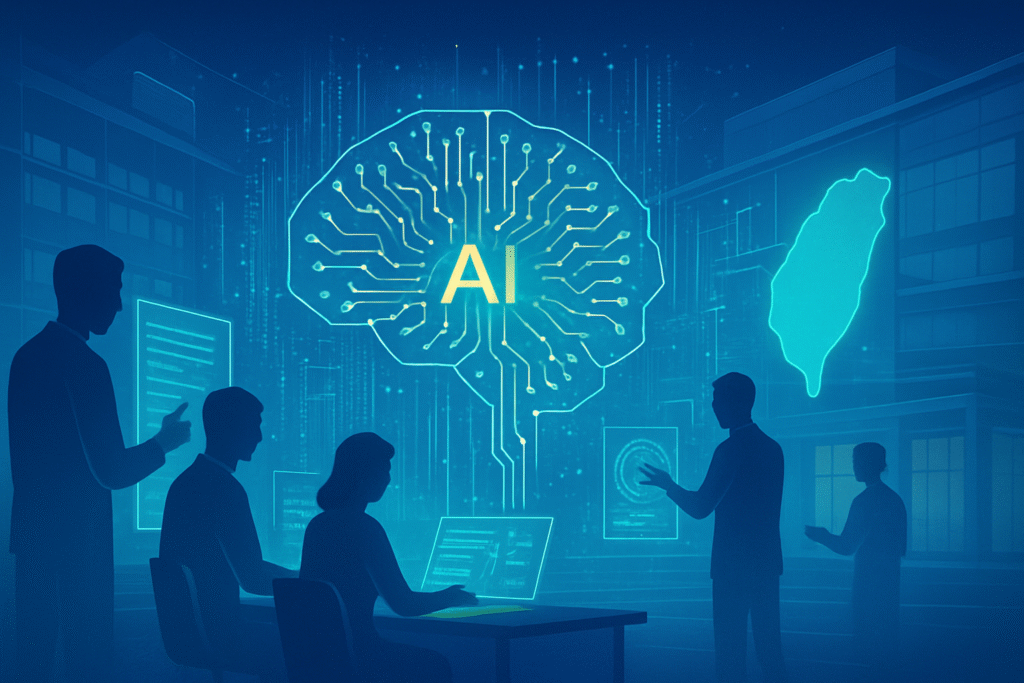
Taiwan is embarking on an ambitious and multi-faceted journey to solidify its position as a global Artificial Intelligence (AI) powerhouse. Through a comprehensive national strategy, the island nation is meticulously weaving together government policies, academic programs, and industry partnerships to not only cultivate a new generation of AI talent but also to staunchly retain its brightest minds against fierce international competition. This concerted effort, reaching its stride in late 2025, underscores Taiwan's commitment to leveraging its formidable semiconductor foundation to drive innovation across diverse AI applications, from smart manufacturing to advanced healthcare.
A Symphony of Collaboration: Government, Academia, and Industry Unite for AI Excellence
Taiwan's strategic approach to AI talent development is characterized by an intricate web of collaborations designed to create a vibrant and self-sustaining AI ecosystem. At the heart of this endeavor is the Taiwan AI Action Plan 2.0, launched in 2023, which explicitly aims to "drive industrial transformation and upgrading through AI, enhance social welfare through AI, and establish Taiwan as a global AI powerhouse," with "talent optimization and expansion" as a core pillar. Complementing this is the "Chip-Driven Taiwan Industrial Innovation Initiative" (November 2023), which leverages Taiwan's world-leading semiconductor industry to integrate AI into innovative applications, and the ambitious "10 new AI infrastructure initiatives" slated for 2025, focusing on core technological areas like silicon.
Government efforts are robust and far-reaching. The Ministry of Economic Affairs' 2025 AI Talent Training Programme, commencing in August 2025, is a significant undertaking designed to train 200,000 AI professionals over four years. Its initial phase will develop 152 skilled individuals through a one-year curriculum that includes theoretical foundations, practical application, and corporate internships, with participants receiving financial support and committing to at least two years of work with a participating company. The Ministry of Digital Affairs (MODA), in March 2025, also outlined five key strategies—computing power, data, talent, marketing, and funding—and launched an AI talent program to enhance AI skills within the public sector, collaborating with the National Academy of Civil Service and the Taiwan AI Academy (AIA). Further demonstrating this commitment, the "Taiwan AI Government Talent Office" (TAIGTO) was launched in July 2025 to accelerate AI talent incubation within the public sector, alongside the Executive Yuan's AI Literacy Program for Civil Servants (June 2025).
Universities are critical partners in this national effort. The Taiwan Artificial Intelligence College Alliance (TAICA), launched in September 2024 by the Ministry of Education and 25 universities (including top institutions like National Taiwan University (NTU), National Tsing Hua University (NTHU), and National Cheng Kung University (NCU)), aims to equip over 10,000 students with AI expertise within three years through intercollegiate courses. Leading universities also host dedicated AI research centers, such as NTU's MOST Joint Research Center for AI Technology and All Vista Healthcare (AINTU) and the NVIDIA-NTU Artificial Intelligence Joint Research Center. National Yang Ming Chiao Tung University (NYCU) boasts Pervasive AI Research (PAIR) Labs and a College of Artificial Intelligence, significantly expanding its AI research infrastructure through alumni donations from the semiconductor and electronics industries. The "National Key Area Industry-Academia Collaboration and Talent Cultivation Innovation Act" (2021) has further spurred a 10% increase in undergraduate and 15% increase in graduate programs in key areas like semiconductors and AI.
Industry collaboration forms the third pillar, bridging academic research with real-world application. The Ministry of Economic Affairs' 2025 AI Talent Training Program has already attracted over 60 domestic and international companies, including Microsoft Taiwan and Acer (TWSE: 2353), to provide instructors and internships. The "Chip-based Industrial Innovation Program (CBI)" fosters innovation by integrating AI across various sectors. The Industrial Technology Research Institute (ITRI) acts as a crucial government think tank and industry partner, driving R&D in smart manufacturing, healthcare, and AI robotics. International tech giants like Microsoft (NASDAQ: MSFT) and Google (NASDAQ: GOOGL) have established AI R&D bases in Taiwan, fostering a vibrant ecosystem. Notably, NVIDIA (NASDAQ: NVDA) actively collaborates with Taiwanese universities, and CEO Jensen Huang announced plans to donate an "AI Factory," a large-scale AI infrastructure facility, accessible to both academia and industry. Semiconductor leaders such as Taiwan Semiconductor Manufacturing Company (TSMC) (TWSE: 2330) and MediaTek (TWSE: 2454) have established university research centers and engage in joint research, leveraging their advanced fabrication technologies crucial for AI development.
Competitive Edge: How Taiwan's AI Talent Strategy Reshapes the Tech Landscape
Taiwan's aggressive push to cultivate and retain AI talent has profound implications for a diverse array of companies, from local startups to global tech giants. Companies like Microsoft Taiwan, ASE Group (TWSE: 3711), and Acer (TWSE: 2353) stand to directly benefit from the Ministry of Economic Affairs' 2025 AI Talent Training Programme, which provides a direct pipeline of skilled professionals, some with mandatory work commitments post-graduation, ensuring a steady supply of local talent. This not only reduces recruitment costs but also fosters a deeper integration of AI expertise into their operations.
For major AI labs and tech companies, particularly those with a significant presence in Taiwan, the enhanced talent pool strengthens their local R&D capabilities. NVIDIA's collaborations with universities and its planned "AI Factory" underscore the strategic value of Taiwan's talent. Similarly, semiconductor behemoths like TSMC (TWSE: 2330), MediaTek (TWSE: 2454), and AMD (NASDAQ: AMD), which already have deep roots in Taiwan, gain a competitive advantage by having access to a highly specialized workforce at the intersection of chips and AI. This synergy allows them to push the boundaries of AI hardware and optimize software-hardware co-design, crucial for next-generation AI.
The influx of well-trained AI professionals also catalyzes the growth of local AI startups. With a robust ecosystem supported by government funding, academic research, and industry mentorship, new ventures find it easier to access the human capital needed to innovate and scale. This could lead to disruption in existing products or services by fostering novel AI-powered solutions across various sectors, from smart cities to personalized healthcare. Taiwan's strategic advantages include its world-class semiconductor manufacturing capabilities, which are fundamental to AI, and its concerted effort to create an attractive environment for both domestic and international talent. The "global elite card" initiative, offering incentives for high-income foreign professionals, further enhances Taiwan's market positioning as a hub for AI innovation and talent.
Global Implications: Taiwan's AI Ambitions on the World Stage
Taiwan's comprehensive AI talent strategy fits squarely into the broader global AI landscape, where nations are fiercely competing to lead in this transformative technology. By focusing on sovereign AI and computing power, coupled with significant investment in human capital, Taiwan aims to carve out a distinct and indispensable niche. This initiative is not merely about domestic development; it's about securing a strategic position in the global AI supply chain, particularly given its dominance in semiconductor manufacturing, which is the bedrock of advanced AI.
The impacts are multi-fold. Firstly, it positions Taiwan as a reliable partner for international AI research and development, fostering deeper collaborations with global tech leaders. Secondly, it could accelerate the development of specialized AI applications tailored to Taiwan's industrial strengths, such as smart manufacturing and advanced chip design. Thirdly, it serves as a model for other nations seeking to develop their own AI ecosystems, particularly those with strong existing tech industries.
However, potential concerns include the continued threat of talent poaching, especially from mainland China, despite the Taiwanese government's legal actions since 2021 to prevent such activities. Maintaining a competitive edge in salaries and research opportunities will be crucial. Comparisons to previous AI milestones reveal that access to skilled human capital is as vital as computational power and data. Taiwan's proactive stance, combining policy, education, and industry, echoes the national-level commitments seen in other AI-leading regions, but with a unique emphasis on its semiconductor prowess. The "National Talent Competitiveness Jumpstart Program" (September 2024), aiming to train 450,000 individuals and recruit 200,000 foreign professionals by 2028, signifies the scale of Taiwan's ambition and its commitment to international integration.
The Horizon: Anticipating Future AI Developments in Taiwan
Looking ahead, Taiwan's AI talent strategy is poised to unlock a wave of near-term and long-term developments. In the near term, the "AI New Ten Major Construction" Plan (June 2025), with its NT$200 billion (approx. $6.2 billion USD) allocation, will significantly enhance Taiwan's global competitiveness in AI, focusing on sovereign AI and computing power, cultivating AI talent, smart government, and balanced regional AI development. The annual investment of NT$150 billion specifically for AI talent cultivation within this plan signals an unwavering commitment.
Expected applications and use cases on the horizon include further advancements in AI-driven smart manufacturing, leveraging Taiwan's industrial base, as well as breakthroughs in AI for healthcare, exemplified by ITRI's work on AI-powered chatbots and pain assessment systems. The integration of AI into public services, driven by MODA and TAIGTO initiatives, will lead to more efficient and intelligent government operations. Experts predict a continued focus on integrating generative AI with chip technologies, as outlined in the "Chip-based Industrial Innovation Program (CBI)," leading to innovative solutions across various sectors.
Challenges that need to be addressed include sustaining the momentum of talent retention against global demand, ensuring equitable access to AI education across all demographics, and adapting regulatory frameworks to the rapid pace of AI innovation. The National Science and Technology Council (NSTC) Draft AI Basic Act (early 2025) is a proactive step in this direction, aiming to support the AI industry through policy measures and legal frameworks, including addressing AI-driven fraud and deepfake activities. What experts predict will happen next is a deepening of industry-academia collaboration, an increased flow of international AI talent into Taiwan, and Taiwan becoming a critical node in the global development of trustworthy and responsible AI, especially through initiatives like Taiwan AI Labs.
A Strategic Leap Forward: Taiwan's Enduring Commitment to AI
Taiwan's comprehensive strategy for retaining and developing AI talent represents a significant leap forward in its national technology agenda. The key takeaways are clear: a deeply integrated approach spanning government, universities, and industry is essential for building a robust AI ecosystem. Government initiatives like the "Taiwan AI Action Plan 2.0" and the "AI New Ten Major Construction" plan provide strategic direction and substantial funding. Academic alliances such as TAICA and specialized university research centers are cultivating a highly skilled workforce, while extensive industry collaborations with global players like Microsoft, NVIDIA, TSMC, and local powerhouses ensure that talent is nurtured with real-world relevance.
This development's significance in AI history lies in Taiwan's unique position at the nexus of advanced semiconductor manufacturing and burgeoning AI innovation. By proactively addressing talent development and retention, Taiwan is not just reacting to global trends but actively shaping its future as a critical player in the AI revolution. Its focus on sovereign AI and computing power, coupled with a commitment to attracting international talent, underscores a long-term vision.
In the coming weeks and months, watch for the initial outcomes of the Ministry of Economic Affairs' 2025 AI Talent Training Programme, the legislative progress of the NSTC Draft AI Basic Act, and further announcements regarding the "AI New Ten Major Construction" Plan. The continued evolution of university-industry partnerships and the expansion of international collaborations will also be key indicators of Taiwan's success in cementing its status as a global AI talent hub.
This content is intended for informational purposes only and represents analysis of current AI developments.
TokenRing AI delivers enterprise-grade solutions for multi-agent AI workflow orchestration, AI-powered development tools, and seamless remote collaboration platforms.
For more information, visit https://www.tokenring.ai/.





